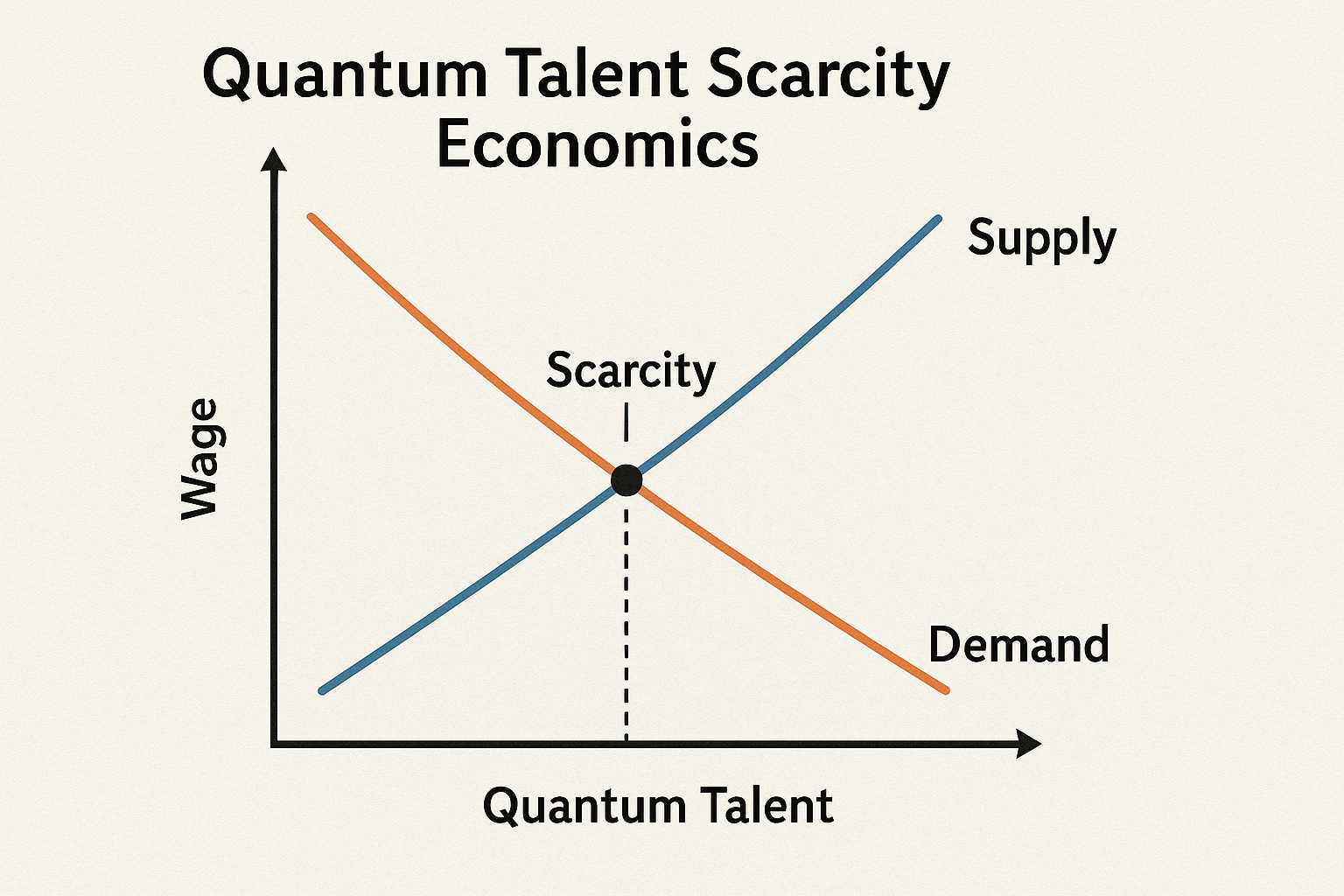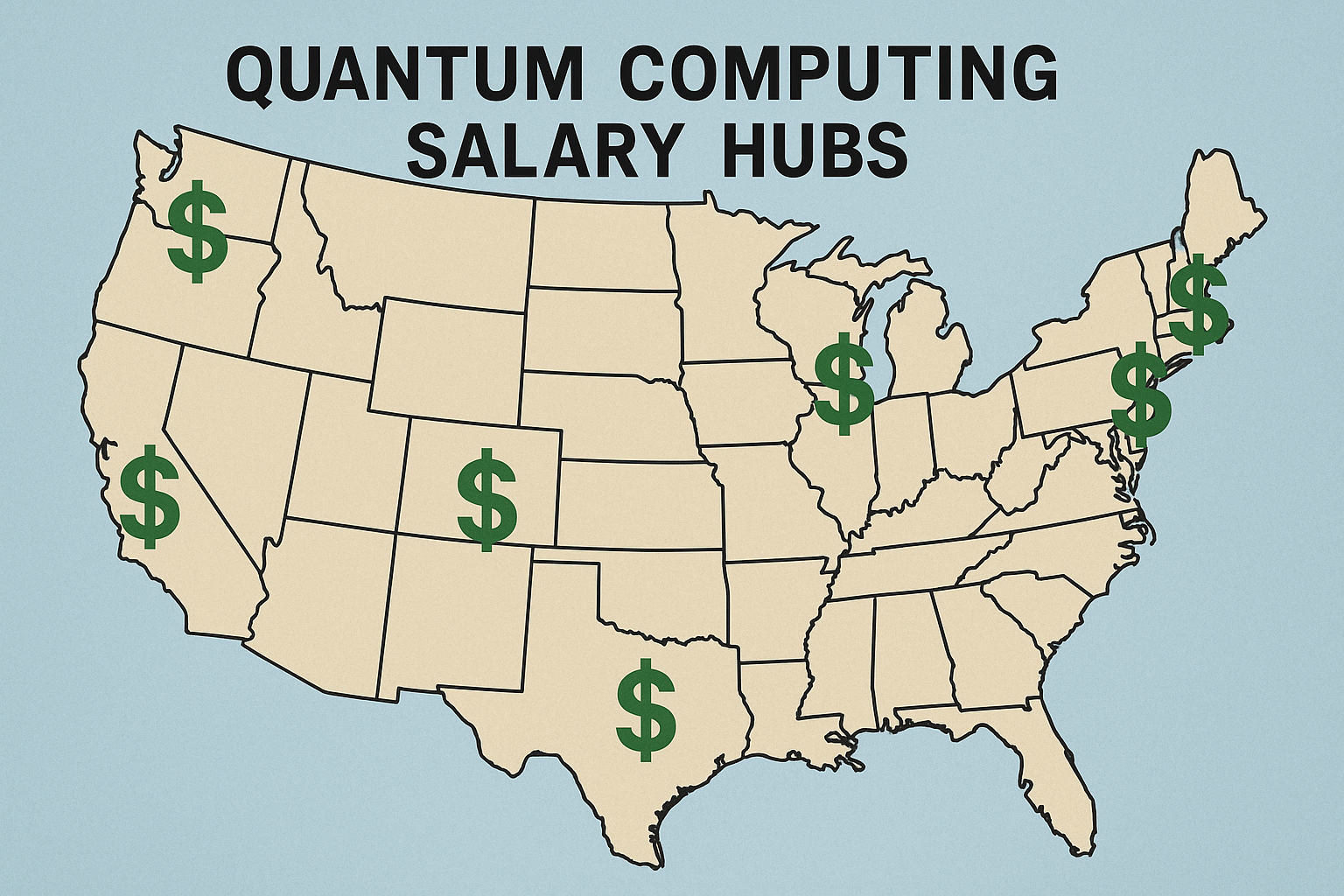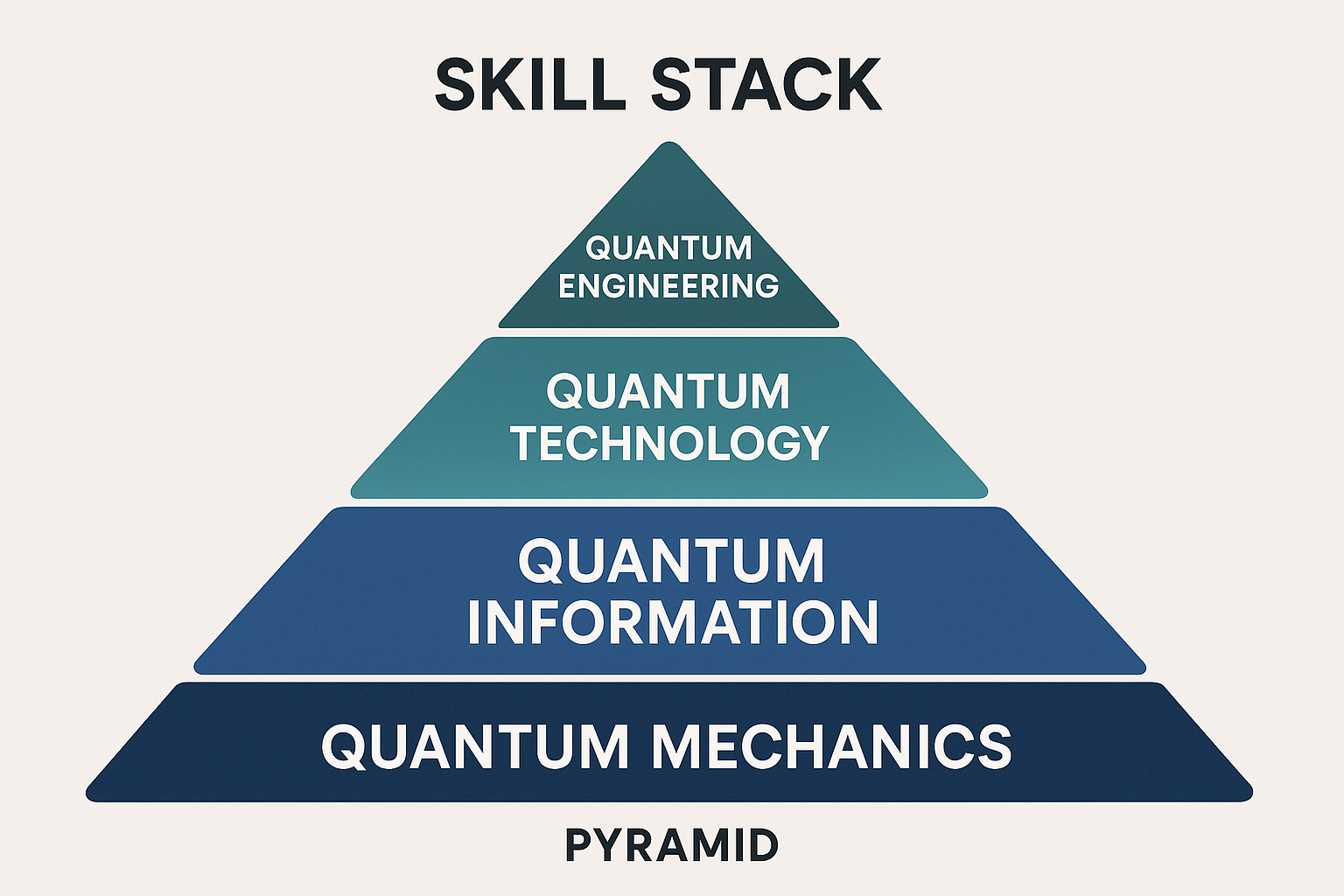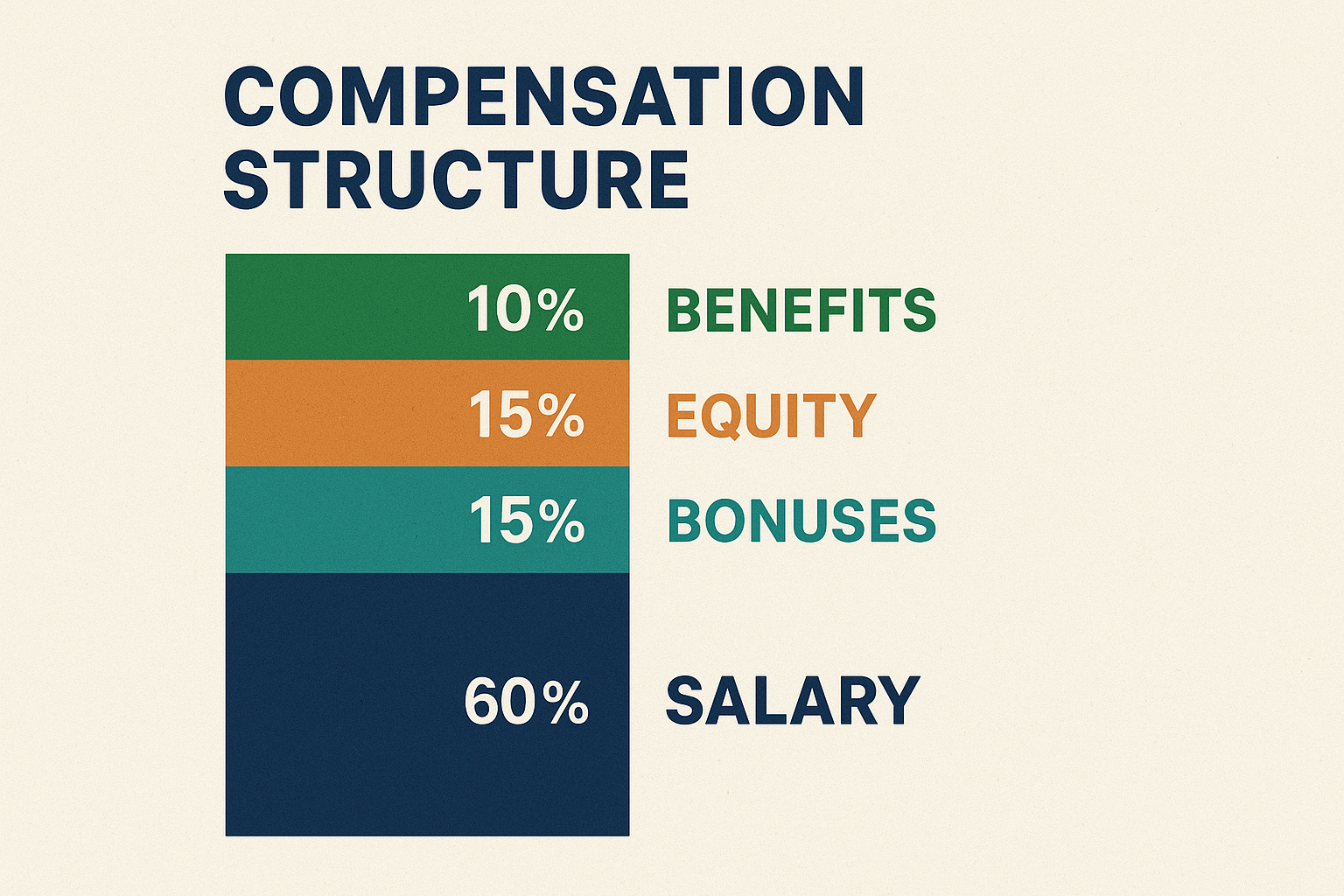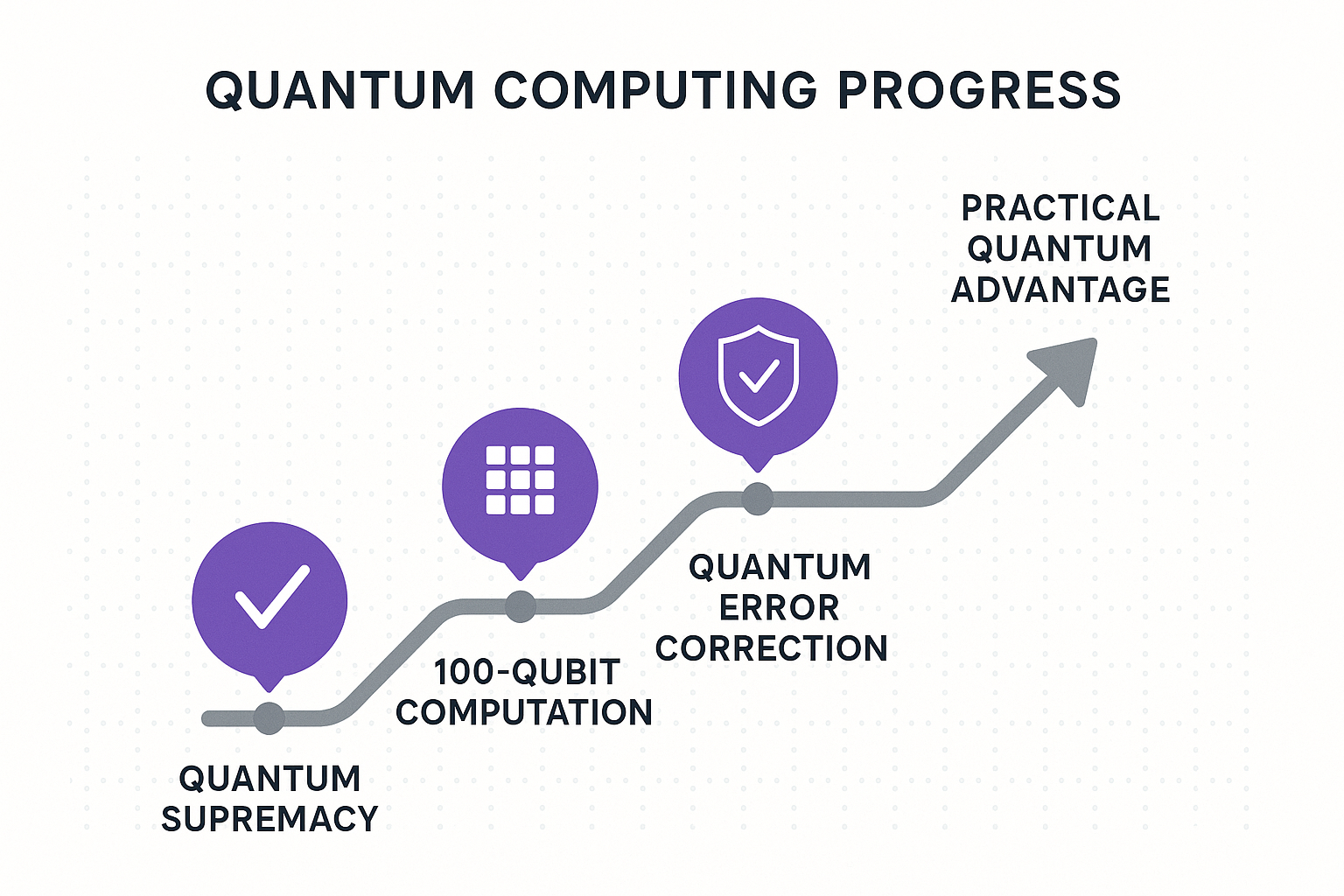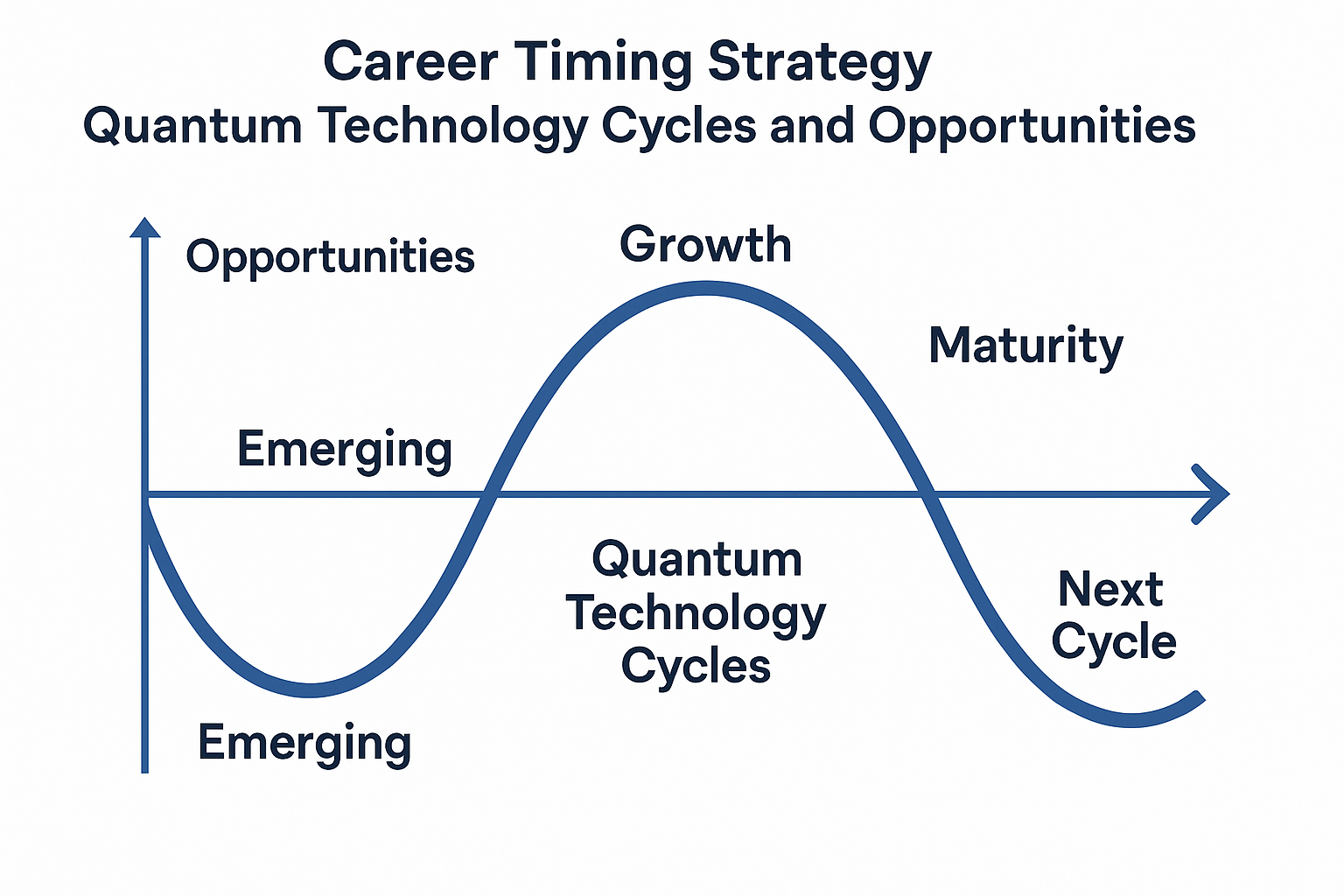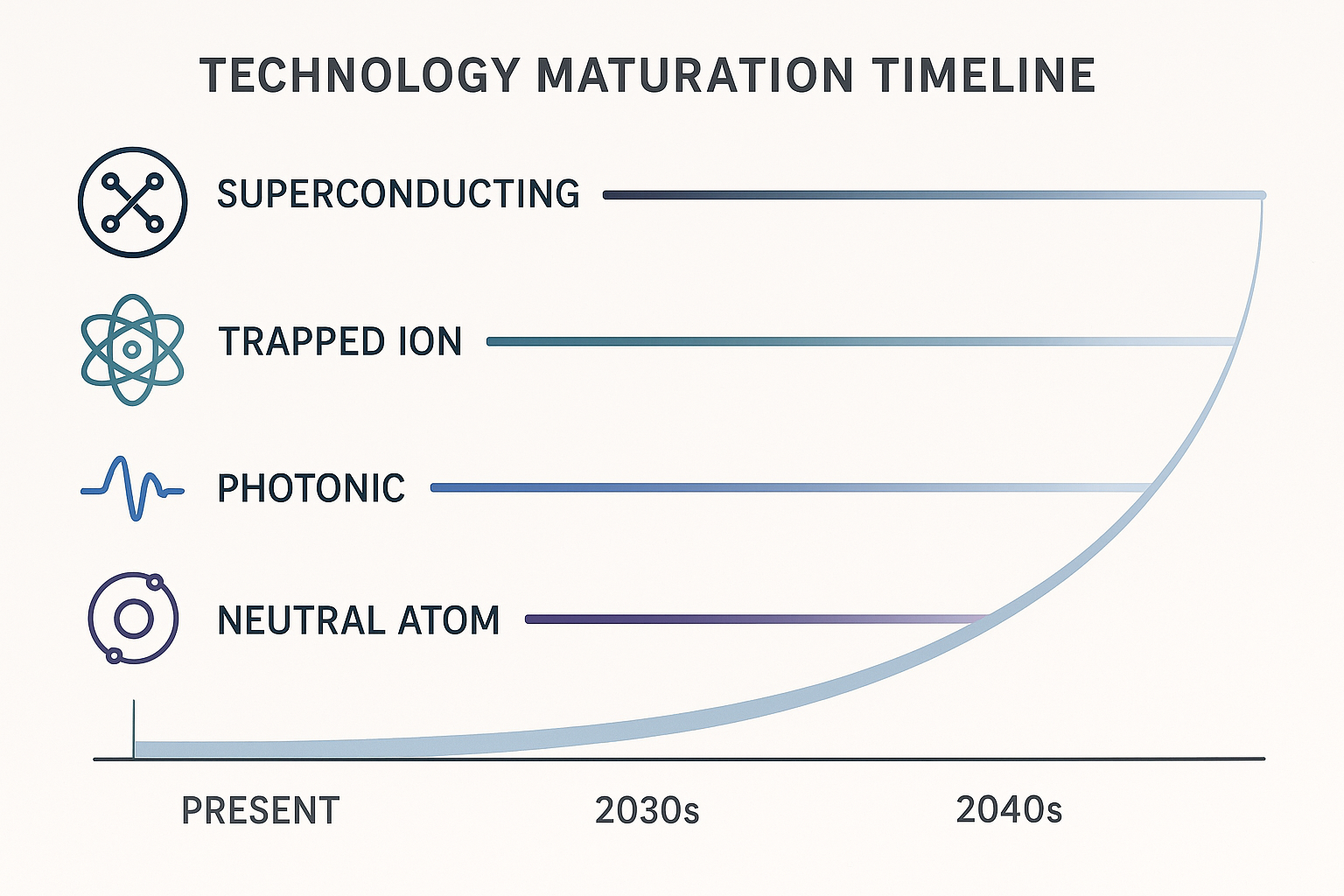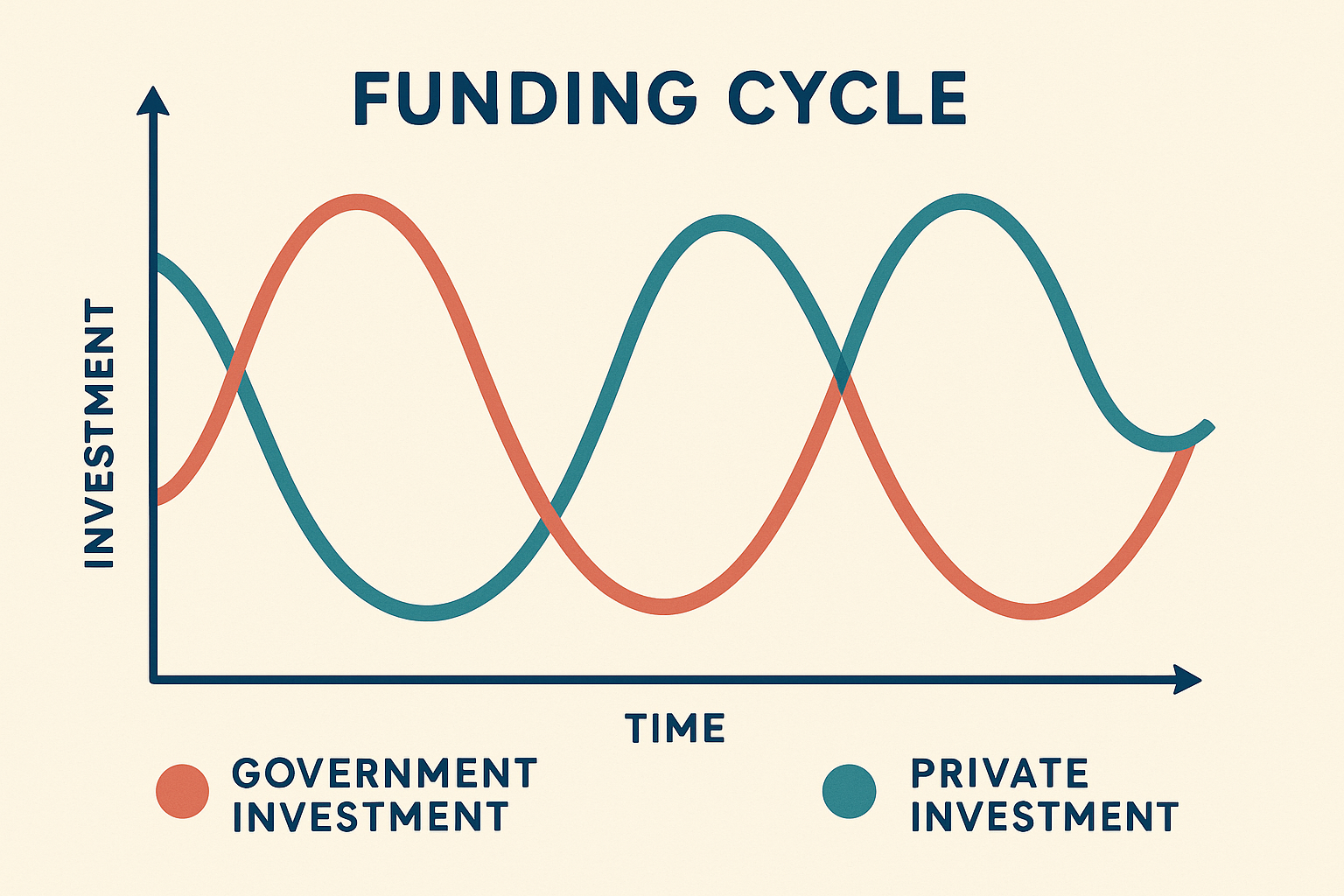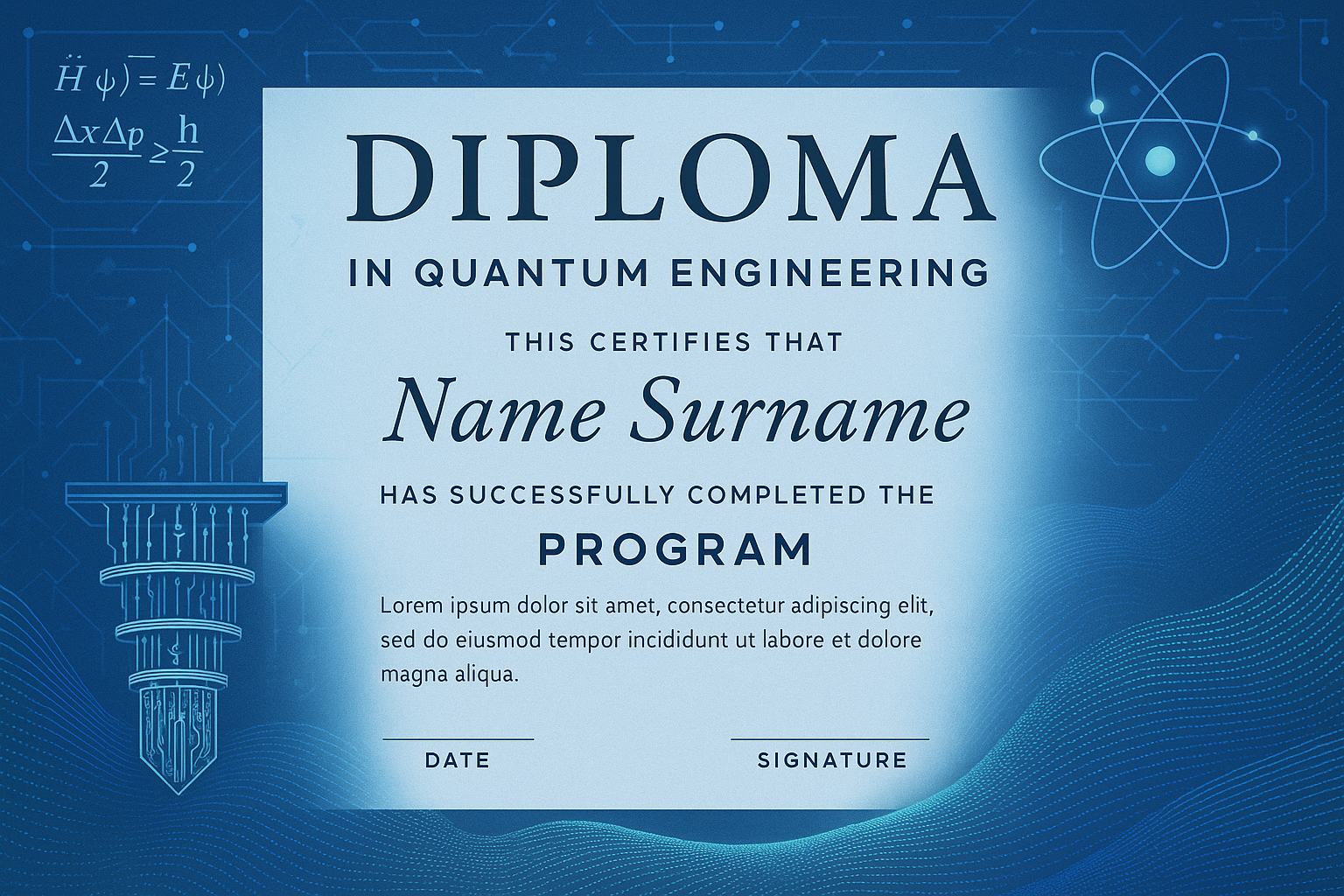When Dr. Leila Fernandez transitioned from classical systems to quantum computing at IBM, her base salary increased by nearly 40% – a jump that reflects the unique economics driving quantum engineering compensation. This isn’t about supply and demand; it’s about understanding a completely different salary ecosystem that most engineers are navigating blindly.
Table of Contents
- The Hidden Economics Behind Quantum Talent
- Your Skill Stack is Worth More Than You Think
- Beyond Base Salary: The Real Money Game
- Timing Your Quantum Career Moves Like a Pro
- ValidGrad: Getting Your Credentials Right
- Final Thoughts
TL;DR
- Quantum engineering operates on scarcity economics that intensify as the field grows, not traditional supply-demand curves
- Geographic location matters less than ecosystem type – Silicon Valley pays for software, Boston for hardware, Chicago for networking
- The highest salaries come from skill combinations, not quantum knowledge alone – business translation skills can add 30-40% to your paycheck
- Equity and IP revenue sharing often matter more than base salary in quantum roles
- Career timing around hype cycles and funding waves can dramatically impact your earning potential
- Government and private sector roles require different strategic approaches to maximize compensation
The Hidden Economics Behind Quantum Talent
Most quantum engineers don’t realize they’re operating in a completely different economic system than traditional tech workers. The quantum job market runs on scarcity principles that actually get more intense as the field expands, creating unique opportunities for those who understand the underlying dynamics. This isn’t your typical supply-and-demand situation – it’s more of a talent arbitrage game where positioning matters more than pure technical skills.
Understanding the financial landscape of quantum engineering requires examining how much do quantum engineers make compared to traditional engineering roles, which often involves complex credential verification processes similar to those needed when professionals need to replace lost diplomas during career transitions.
The Scarcity Premium That Keeps Growing
Unlike other engineering fields where more graduates eventually balance out demand, quantum engineering exists in perpetual scarcity. Each breakthrough creates exponentially more opportunities rather than filling existing gaps. This means early-career quantum engineers benefit from compound salary appreciation that doesn’t exist in traditional tech roles.
According to McKinsey & Company’s 2024 report, the quantum computing field has experienced a 35% increase in available positions within just two years, with salaries increasing at a rate of 10% annually – far outpacing traditional tech roles which see 3-5% growth. Source: Quantum Jobs US
Why Quantum Demand Grows Exponentially, Not Linearly
Every quantum computing milestone doesn’t create a few more jobs – it opens entire new categories of work. When IBM announces a 1000-qubit processor, that doesn’t mean IBM needs more engineers. It means every major corporation suddenly needs quantum strategy consultants, integration specialists, and hybrid system architects.
You can leverage this by tracking quantum milestones and patent filings to predict where demand spikes will happen next. Position yourself in subspecialties before they hit mainstream – quantum error correction and quantum networking are prime examples right now. Most importantly, build expertise in quantum-classical hybrid systems since that’s where the real near-term applications will emerge.
The Cross-Industry Value Multiplier Effect
Quantum engineers who bridge into traditional industries command premium salaries because they translate quantum advantages into actual business value. A quantum engineer who understands pharmaceutical drug discovery can earn significantly more than one who only knows the technical aspects.
Focus on industries with quantum-ready problems – optimization, simulation, and cryptography. Develop real domain expertise in one vertical while maintaining your quantum technical skills. Build a portfolio that demonstrates quantum solutions to actual business problems, not theoretical improvements.
Geographic Salary Distortions You Need to Know About
Quantum engineering salaries vary dramatically based on what type of quantum ecosystem each region is building. It’s not about cost of living adjustments – different hubs pay premiums for completely different specializations, creating strategic opportunities for career geography.
When considering how much do quantum engineers make, location becomes a critical factor that goes beyond traditional salary calculations.
| Region | Specialization Focus | Average Salary Range | Key Companies |
|---|---|---|---|
| Silicon Valley | Quantum Software/AI | $140,000 – $400,000 | Google Quantum AI, IBM |
| Boston | Hardware/Systems | $120,000 – $350,000 | MIT Lincoln Lab, Quantum Circuits |
| Chicago | Networking/Communications | $110,000 – $280,000 | Argonne National Lab, Fermilab |
| Austin | Integration/Consulting | $100,000 – $250,000 | Dell Quantum, Local Startups |
| Remote | Software Development | $95,000 – $220,000 | Various Quantum Companies |
How Different Quantum Hubs Pay for Different Skills
Silicon Valley quantum companies pay top dollar for quantum software engineers and algorithm developers. Boston’s quantum hardware ecosystem rewards circuit designers and systems engineers. Emerging hubs such as Chicago focus on quantum networking and communication specialists. Understanding these regional specializations can significantly impact your earning potential.
Map your specific specialization to the highest-paying geographic clusters. Consider remote work arbitrage opportunities, especially in quantum consulting where location matters less. Time your moves to coincide with major quantum investments in specific regions – when a city announces a quantum initiative, salaries typically spike 20-30% within six months.
Navigating the Government vs Private Sector Salary Tension
National security implications create unique salary dynamics in quantum engineering. Government roles offer stability and security clearance value, while private sector offers equity upside and faster salary growth. The key is strategic sequencing, not choosing one over the other permanently.
The University of Queensland recently posted a Senior Lecturer position in Quantum Decarbonisation with a “base salary in the range $137,542.79 – $158,351.30 + 17% Superannuation” Times Higher Education, demonstrating how academic institutions are competing with private sector compensation to attract quantum talent.
Start in government or academic roles to build security clearance and foundational expertise that private companies value highly. Transition to private sector during quantum commercialization phases when your government experience becomes a competitive advantage. Consider quantum consulting as a bridge between sectors – it maintains government relationships while capturing private sector upside.
Your Skill Stack is Worth More Than You Think
Quantum engineering salaries aren’t determined by quantum knowledge alone. The highest earners master specific skill combinations that create multiplicative value rather than adding more capabilities to their resume. Understanding which combinations matter most can dramatically impact your compensation trajectory.
Many quantum engineers find themselves needing to document their evolving skill sets properly, especially when transitioning between sectors or advancing their careers, which sometimes requires obtaining replacement diplomas that accurately reflect their current expertise and specializations.
Finding the Sweet Spot Between Deep and Broad Expertise
The highest-paid quantum engineers aren’t necessarily the ones with the deepest theoretical knowledge or the broadest technical skills. They’re the ones who find the perfect balance between quantum expertise and practical implementation ability. This equilibrium creates unique value propositions that justify premium compensation packages.
The Integration Premium That Most Engineers Miss
Engineers who excel at integrating quantum algorithms with classical computing infrastructure consistently earn 30-40% more than pure quantum theorists. This premium exists because they solve real-world implementation challenges that actually matter to businesses trying to deploy quantum solutions.
Quantum engineers specializing in quantum algorithm design command a 15-25% salary premium, while those with quantum error correction expertise earn 10-20% more than baseline quantum roles. Knowledge of specific programming languages such as Qiskit, Cirq, and Q# each add 10-15% to compensation packages. Source: Quantum Jobs US
Master quantum development frameworks including Qiskit, Cirq, and Q# alongside classical optimization techniques. Build expertise in quantum-classical hybrid algorithms since most practical applications will be hybrid for the foreseeable future. Understanding quantum hardware limitations and classical workarounds makes you invaluable to companies trying to bridge theory and practice.
A quantum software engineer at a financial services firm increased their salary from $130,000 to $180,000 by developing expertise in quantum-classical hybrid optimization algorithms. They focused on portfolio optimization problems that could run partially on quantum hardware while using classical computers for preprocessing and post-processing, making their solutions immediately deployable rather than theoretical.
Why Business Translation Skills Command C-Suite Compensation
Quantum engineers who can articulate quantum advantages in business terms and ROI calculations get invited to C-suite meetings and receive compensation packages that reflect that access. Technical brilliance alone doesn’t get you there – you need to speak the language of business impact.
Study quantum use cases in your target industry until you can discuss them fluently with non-technical stakeholders. Learn to quantify quantum speedups in business metrics that executives care about – cost savings, time to market, competitive advantages. Practice presenting quantum concepts without using quantum jargon, focusing instead on outcomes and opportunities.
Emerging Specializations Creating New Salary Categories
New quantum specializations emerge faster than traditional career paths, creating opportunities for early movers to essentially define entirely new salary categories. These aren’t variations on existing roles – they’re completely new types of work that didn’t exist five years ago.
Quantum Security Architecture: The Urgent Premium
As quantum computers threaten current cryptography, quantum security architects who design post-quantum cryptographic systems command premium salaries due to urgent enterprise needs. Every major corporation knows they need to prepare for post-quantum cryptography, but few have internal expertise to guide the transition.
Master post-quantum cryptography standards, especially the NIST selections that are becoming industry requirements. Understand quantum key distribution and quantum-safe protocols from both theoretical and implementation perspectives. Gain experience in enterprise security architecture so you can speak to existing security teams in their language.
Algorithm Optimization: Where Theory Meets Reality
Specialists who optimize quantum algorithms for specific hardware constraints earn premium salaries because they bridge the gap between theoretical quantum advantage and practical implementation. This role didn’t exist when quantum computing was purely theoretical, but now it’s critical for any company trying to deploy quantum solutions.
Study quantum error correction and noise models for different hardware platforms. Learn hardware-specific optimization techniques for superconducting, trapped ion, and photonic quantum systems. Build a portfolio of optimized quantum algorithms for real applications, demonstrating measurable improvements over generic implementations.
Quantum Machine Learning: The Convergence Premium
Engineers who combine quantum computing with machine learning represent one of the highest-growth salary categories. They enable quantum advantages in AI applications, positioning themselves at the intersection of two of the most valuable technical fields.
Master both classical ML and quantum ML algorithms, understanding where quantum approaches provide genuine advantages. Study quantum feature spaces and quantum kernels, focusing on practical applications rather than theoretical possibilities. Build projects demonstrating quantum ML advantages on real datasets, not toy problems.
A machine learning engineer transitioned to quantum ML by focusing on quantum feature maps for drug discovery. They started with a $95,000 base salary but negotiated up to $140,000 plus equity by demonstrating how quantum feature spaces could accelerate molecular property prediction by 10x compared to classical methods, directly impacting pharmaceutical R&D timelines.
Beyond Base Salary: The Real Money Game
Quantum engineering compensation extends far beyond traditional salary models. The real money often comes from equity stakes, IP ownership, research funding, and performance bonuses tied to quantum milestones that don’t exist in other fields. Understanding these alternative compensation structures can multiply your total earnings far beyond what base salary alone would suggest.
When evaluating total compensation packages, quantum engineers often need to consider whether pursuing advanced degrees or certifications is worth the investment, similar to the broader question of whether getting a college degree is worth it in today’s rapidly evolving tech landscape. The question of how much do quantum engineers make becomes more complex when you factor in these alternative compensation structures.
Equity and IP Ownership: The Long-Term Wealth Strategy
Quantum startups and established companies offer unique equity structures and intellectual property sharing arrangements that can create significant long-term wealth. The technical barriers to entry in quantum computing mean companies often offer higher equity percentages and more generous IP terms than traditional tech companies.
Equity packages at quantum startups typically range from 10-30% of base salary value, while major tech companies offer RSUs worth 15-40% of total compensation. Performance bonuses in quantum roles average 10-25% of base salary, with signing bonuses ranging from $10,000-$50,000 for senior positions. Source: Quantum Jobs US
Evaluating Quantum Startup Equity
Early-stage quantum companies often offer higher equity percentages than traditional tech startups because the talent pool is smaller and the technical barriers are higher. However, not all quantum equity is created equal – you need to understand the underlying technology and market dynamics to evaluate these opportunities properly.
Understand the quantum technology’s competitive moat and patent landscape before accepting equity offers. Assess the founding team’s track record in quantum commercialization, not academic achievements alone. Evaluate the company’s realistic path to quantum advantage and market timing – many quantum companies are too early or targeting problems that don’t need quantum solutions.
| Compensation Component | Quantum Startups | Large Tech Companies | Government/Academic |
|---|---|---|---|
| Base Salary | $80,000 – $200,000 | $130,000 – $400,000 | $70,000 – $180,000 |
| Equity Value | 10-30% of base | 15-40% of base | N/A |
| Performance Bonus | 15-35% of base | 10-25% of base | 5-15% of base |
| Research Budget | $5,000 – $15,000 | $10,000 – $50,000 | $20,000 – $100,000 |
| Conference/Education | $5,000 – $10,000 | $10,000 – $25,000 | $15,000 – $30,000 |
Patent Revenue Sharing: Your Passive Income Stream
Many quantum engineering roles include IP revenue sharing arrangements where engineers receive ongoing royalties from quantum patents they develop. This creates long-term passive income streams that can continue generating money long after you’ve moved to other roles.
Understand your company’s IP policy and revenue sharing structure before you start developing innovations. Focus on developing patentable quantum innovations with clear commercial applications rather than theoretical advances. Build relationships with patent attorneys who specialize in quantum technologies – they can help you identify patentable aspects of your work that you might otherwise miss.
Performance-Based Bonuses Tied to Quantum Milestones
Quantum companies increasingly tie substantial bonuses to technical milestones such as achieving quantum advantage, reducing error rates, or scaling qubit counts. These performance incentives are unique to the quantum field and can significantly boost total compensation for engineers who understand how to structure and achieve these goals.
Quantum Milestone Compensation: The Big Payouts
Companies offer substantial bonuses for achieving quantum computing milestones, with some engineers earning 50-100% salary bonuses for breakthrough achievements. These aren’t participation trophies – they’re tied to genuine technical accomplishments that advance the company’s competitive position.
Negotiate clear, measurable quantum performance metrics that you can actually influence. Understand the technical feasibility and realistic timeline of proposed milestones before agreeing to them. Ensure milestone achievements are within your direct control or influence – don’t accept bonuses tied to company-wide achievements you can’t impact.
A quantum error correction specialist at a hardware company negotiated a $75,000 bonus for achieving a 99.9% fidelity rate on a 50-qubit system. They structured the milestone with specific technical parameters they could directly influence through their algorithm optimization work, rather than accepting a vague “system improvement” target that depended on hardware manufacturing variables outside their control.
Research Grants and Publication Bonuses: The Academic Advantage
Many quantum engineering roles include bonuses for securing research grants or publishing high-impact papers, recognizing the research-intensive nature of the field. This creates additional income streams for engineers who can successfully bridge industry and academic work.
Develop grant writing skills specifically for quantum research funding – it’s a learnable skill that can generate significant bonus income. Build collaborations with academic institutions and national labs to increase your publication opportunities. Focus on publishing in high-impact quantum computing journals where publications carry more bonus weight.
Timing Your Quantum Career Moves
Quantum engineering career timing requires understanding technology maturation cycles, funding waves, and market adoption phases. The field moves in predictable patterns that create optimal windows for job changes, salary negotiations, and career pivots. Getting the timing right can dramatically impact your earning potential and career trajectory.
Strategic career timing in quantum engineering often requires having proper documentation ready for opportunities, which is where services for academic transcripts become crucial for professionals transitioning between sectors or pursuing international quantum research positions.
Understanding Quantum Hype Cycles and Salary Waves
Quantum engineering salaries fluctuate with hype cycles and technological breakthroughs in predictable patterns. Understanding these cycles helps you time career moves for maximum compensation while maintaining stability during quieter periods. The key is recognizing where we are in the cycle and positioning accordingly.
According to a 2024 McKinsey survey, 65% of quantum industry leaders now believe fault-tolerant quantum computing will be achieved by 2030, creating unprecedented demand for quantum talent as “companies are looking to fill new quantum computing roles” TechTarget to meet this timeline.
Riding the Hype Cycle for Maximum Salary Impact
Understanding where quantum technologies sit on the Gartner hype cycle helps predict salary trends and optimal timing for job changes and negotiations. Peak hype periods create bidding wars for quantum talent, while trough periods offer opportunities to build expertise before the next wave.
Monitor quantum computing announcements and their market impact to gauge hype levels. Track venture capital investment patterns in quantum technologies as a leading indicator of salary trends. Position major career moves to coincide with peak hype phases when you have maximum negotiating leverage.
Technology Maturation Waves: Surfing the Right Platform
Different quantum technologies mature at different rates, creating rolling waves of salary opportunities. Superconducting quantum computers are further along than trapped ion systems, which are ahead of photonic quantum computers. Understanding these maturation timelines helps you position your career for maximum growth.
Identify which quantum technologies are 2-3 years from commercialization and build expertise before they become mainstream. Consider transitioning between quantum technologies as they mature and become commoditized – early expertise in emerging platforms commands premium salaries. Don’t get stuck on a single quantum platform – diversification protects against technology shifts.
Funding Cycles and Their Salary Impact
Quantum engineering salaries closely correlate with government funding cycles and private investment waves. Major funding announcements create predictable salary spikes as organizations compete for talent to win contracts and capture opportunities. Understanding these patterns helps you time career moves for maximum financial impact.
Government Funding: The Predictable Salary Boost
Major government quantum initiatives create salary spikes as organizations compete for quantum talent to win contracts and grants. The U.S. National Quantum Initiative, European Quantum Flagship, and similar programs create predictable windows of increased compensation across the industry.
Track government quantum funding announcements and RFP releases to predict salary increases. Position yourself at organizations likely to win major quantum contracts before the announcements happen. Time salary negotiations to coincide with major funding announcements when companies have budget flexibility and competitive pressure.
Private Investment Multipliers: When VCs Drive Salaries Up
Quantum engineering salaries often spike 20-30% following major private investment rounds in quantum computing. Funded companies compete aggressively for talent, creating temporary salary inflation that benefits all quantum engineers, not those at funded companies alone.
Monitor quantum company funding announcements and valuations to predict salary market movements. Build relationships with recently funded quantum companies before they start aggressive hiring. Time job searches to coincide with major quantum investment waves when multiple companies are competing for the same talent pool.
Quantum Career Timing Checklist:
- Monitor quarterly VC investment reports for quantum funding trends
- Track government quantum initiative announcements and RFP releases
- Follow quantum computing breakthrough announcements from major companies
- Set up Google Alerts for quantum computing salary surveys and market reports
- Build relationships with quantum recruiters during quiet periods
- Prepare negotiation materials before hype cycle peaks
- Diversify quantum technology expertise across multiple platforms
- Time major career moves to coincide with funding announcements
ValidGrad: Getting Your Credentials Right
The quantum engineering field’s rapid evolution creates unique challenges for professionals whose traditional credentials may not reflect their cutting-edge expertise. As quantum technologies outpace educational systems, many quantum engineers find themselves needing documentation that accurately represents their current capabilities and specializations.
ValidGrad addresses this credentialing gap by providing quantum professionals with replacement diplomas and transcripts that better reflect their actual expertise and career positioning. For quantum engineers who’ve transitioned from traditional engineering fields, lost original credentials during career pivots, or need backup documentation for international opportunities in quantum hubs, ValidGrad offers a practical solution.
The company’s customizable diploma templates allow quantum professionals to create replacement credentials that accurately represent their educational background while maintaining the professional appearance necessary for career advancement in this high-stakes field. This is particularly valuable for quantum engineers working with government contractors or international quantum research collaborations where proper documentation is essential.
With ValidGrad’s fast turnaround time and professional quality, quantum engineers can quickly obtain replacement credentials without lengthy delays – ensuring they don’t miss critical career opportunities in this rapidly moving field.
Final Thoughts
The quantum engineering salary landscape operates on fundamentally different principles than traditional tech careers. Understanding these unique dynamics – from scarcity economics to hype cycle timing – can dramatically impact your earning potential and career trajectory.
Success in quantum engineering compensation isn’t about technical expertise alone. It’s about strategic positioning, skill stack optimization, and timing your career moves to capitalize on the field’s unique economic patterns. The engineers earning the highest salaries aren’t necessarily the most technically brilliant – they’re the ones who understand how to navigate this complex ecosystem.
Whether you’re entering the quantum field or looking to optimize your current position, remember that quantum engineering rewards those who think strategically about their careers. The opportunities are unprecedented, but they require a different approach than traditional engineering career paths.
Key Takeaways:
- Quantum engineering salaries follow unique economic principles that reward strategic thinking over pure technical knowledge
- Geographic positioning and timing matter more in quantum careers than in traditional tech roles
- Alternative compensation structures often provide more value than base salary alone
- The field’s rapid evolution creates both opportunities and challenges for career advancement
- Understanding funding cycles and technology maturation patterns helps optimize career timing

